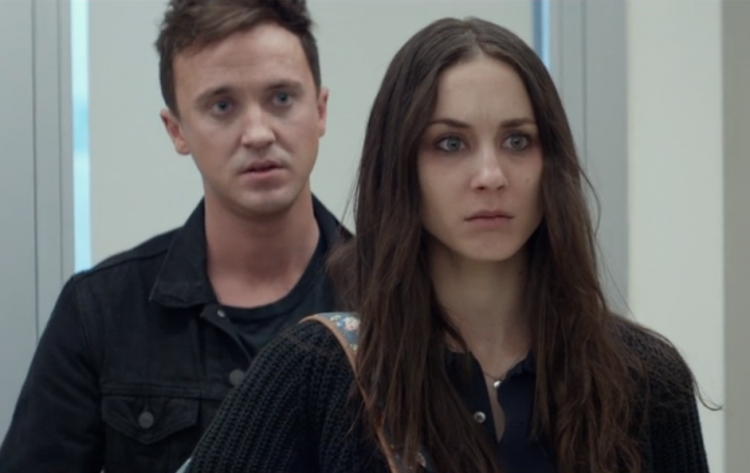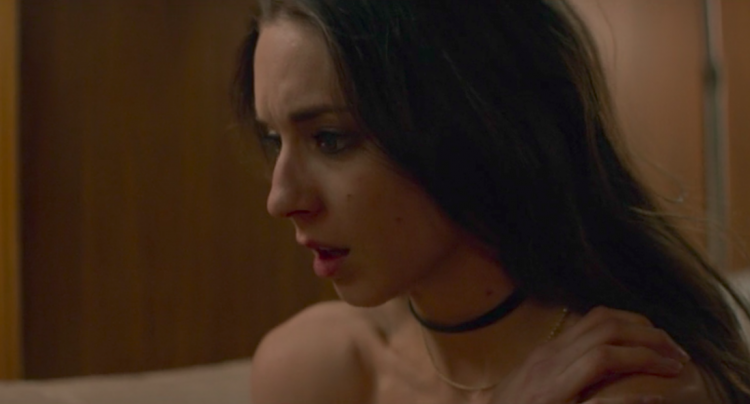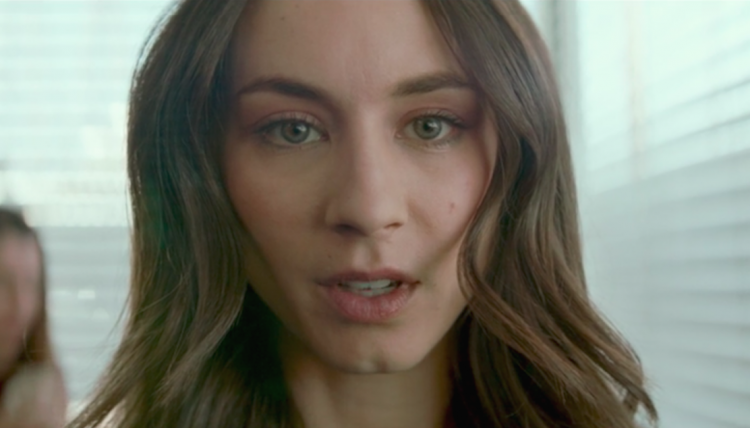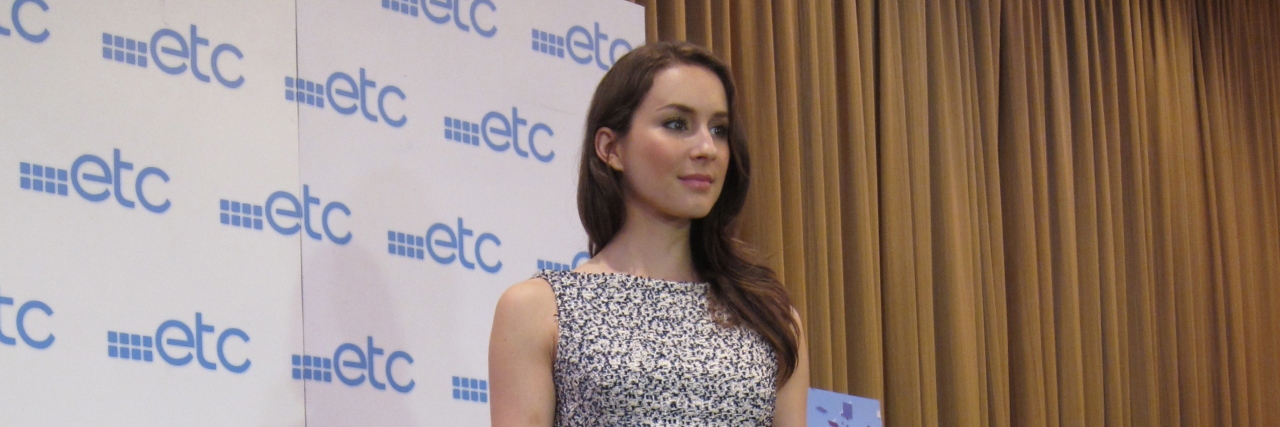Eating disorder stories are often told from the outside looking in. You know the tale: girl has body image issues, girl starts restricting food, there is perhaps some intervention and finally, girl starts her journey towards recovery.
When “Pretty Little Liars” star Troian Bellisario started working on a film inspired by her personal experience with eating disorders, she wanted to tell a different story — one from the inside looking out. Her movie, “Feed,” which she both wrote and stars in, is not your stereotypical eating disorder tale but rather a unique attempt to capture what’s actually going on inside the head of someone with an eating disorder.
“When I started to look at characters with eating disorders and the way they were observed from the outside, I was sort of like, ‘Well, this doesn’t help.’ There’s no movie I can point to that will get my father or my brother to understand why when they told me to just eat the sandwich, I just couldn’t,” she told The Mighty.
Less than one month after her movie’s release (and more than a month after the “Pretty Little Liars” finale) we talked to Bellisario about what inspired her to make a “Feed” and how similar she is to the character she plays, Olivia.
The “Twin Dynamic” of Eating Disorders

“Feed” doesn’t begin with the development of an eating disorder. Instead, we’re introduced to a pair of twins, Olivia Grey (Bellisario) and Matthew Grey (played by Tom Felton) who are starting their first day of high school, senior year. That night, Matthew tragically passes away in an car accident while Olivia, sitting in the passenger’s seat, survives. This trauma is what catalyzes Olivia’s fall into food restriction. The image of her brother appears and talks to her, encouraging her behavior and becoming, we find out, the eating disorder itself.
Growing up, Bellisario’s best friends were a pair of male and female twins. Although she says they’re not the characters who inspired Olivia and Matthew, they’re closeness and twin dynamic resonated with her. When one of them said, “I don’t know who I would be without my twin in my life,” it reminded her of the identity she had built with her eating disorder. She told The Mighty:
Their identity in the world is paired, it’s coupled, and I think that’s something people with mental issues also go through when they start to seek treatment. If you move through the world as somebody who identifies as anorexic, or who identifies as someone struggling with bulimia or with overeating, what happens when you start to forge a new identity? Is there a betrayal to your past self? Are you lying? Or are you getting “better”? Does that ever go away? That’s part of your identity. The way that Olivia is a twin and her twin is not alive anymore, is she not a twin now? For me, that was also something I wanted to explore.
She also hoped representing the eating disorder as a twin would show why disordered behaviors are often so hard to give up. Eating disorders, she said, are not just disorders — they can act as friends. In the movie, Olivia has a hard time giving up her eating disorder because that would mean giving up her brother — who she doesn’t know life without.
What I wanted to do was create a situation in which they could see the physical manifestation of the disease but also how close it is to the person themselves. That’s why it has to be Olivia’s twin brother, Matt, who is her everything in the world. Because I needed them to understand that not only is it a disease. It’s your best friend. It’s your secret. It’s your strength, and it’s your weakness. It’s everything rolled into one, and that’s why it’s so difficult to sever from.
Where Bellisario’s and Olivia’s Stories Collide
In an early scene, Olivia is talking to the principal, who tells her she has the highest consistent GPA in her class and will most likely be the valedictorian. Instead of sounding excited, Olivia notes there’s still a whole school year left and refuses to celebrate early. He then hands her a long list of colleges to apply for, and she takes it eagerly. Later, when she goes for a run before dinner, her dad questions why she didn’t run more. Before we know anything about an eating disorder, we see Olivia is a perfectionist, an overachiever and has been been put under a certain level of pressure from her upper-class family.
The daughter of two movie producers, Bellisario isn’t stranger to high standards and steep expectations, although she admitted some of it was self-imposed. Still, if there was a Venn diagram of her story and Olivia’s, Bellisario said, perfectionism and overachievement would be the main overlap:
Particularly when my eating disorder really started to manifest in a strong way, it was definitely because I didn’t feel like there was any way out. I felt like I have to hold myself to a certain standard of academic performance, of athletic performance, of being the perfect daughter in the best way that I could, and whether or not those standards were being imposed upon me, or whether I was just self-imposing them because I believed that’s what the world wanted from me.
Why Filming the Movie Wasn’t the Hardest Part

To prepare for the role, Bellisario had to enter a dark place from her past — both emotionally and physically. And while she did have to follow certain diet restrictions to lose weight, she said restricting again wasn’t the hard part — it was stopping once the film was finished. Because, in her experience, an eating disorder is a coping mechanism to help deal with a deeper problem, she actually found engaging in old habits helped her deal with the stress. But it came with a cost:
I had permission to go back into that world, and the more difficult part was then extricating myself from those habits…. I was doing press and I was talking about it. Then the struggle became, OK, I’m talking about all of these feelings, but I can’t go back to restricting. I’m not filming it right now, I have to continue to make the choice of health. That, for me, that was the challenging part. Actually engaging with these feelings that the movie brought up but not being able to engage with them in a disordered way.
What Bellisario Hopes You’ll Take Away From It

While Bellisario said “Feed” was a reaction to how eating disorders are presented in the media, it was also a reaction to how people in her life treated her eating disorder. “As caring as they were and as much as they wanted to understand what I was going through… it was like they could have sympathy and not empathy,” she said. “They could have sympathy because they were like, ‘I can see that you’re suffering, I can see that it’s painful, I see that you are engaged in a sort of war with your body,’ but there’s not empathy because they can’t fit themselves into your experience, and into your body.”
She hopes the movie will help friends and family recognize when their loved one is struggling. Often, she said, at the beginning states of an eating disorder, some friends and family realize something is wrong but aren’t quite sure what they’re looking at. She also wants those who are struggling to feel understood and see that, just like Olivia, they deserve treatment and to make steps towards recovery. She told The Mighty:
I just want people to see this movie and also have a different expectation of what it might look like to struggle with this, and I think it’s important that I’m not the only voice out there who’s talking about this. I just want to add more to the conversation, and to support the conversation.
Bellisario received support from the National Association of Eating Disorder (NEDA) during the course of making the film, and to give back, she’s selling “Feed” t-shirts featuring the twins with all proceeds going to NEDA. She said the best reaction she’s gotten to the film has been from people with eating disorders — for whom, she said, the film was really made.
“I think this film it was important for me because it’s my journey of recovery to take my past experience and to take all of these experiences that I’ve heard about, or listened to, and channel it into my work and my art, in order to feel like I didn’t lose a part of my life. Or a part of me isn’t dead and gone, that it can be something that goes turned into creative and hopefully positive gift that I can give to other people,” she said, laughing. “So, it’s a lot to think about.”
You can watch “Feed” now on Amazon or iTunes.
If you or someone you know is struggling with an eating disorder, you can call the National Eating Disorders Association Helpline at 1-800-931-2237.
Lead screenshot via “Feed”
Image via Wikimedia Commons/Cecile Van Straten

